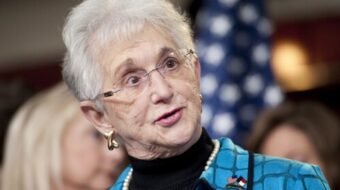Describing the state’s fiscal crisis as “real and unprecedented,” California Governor Jerry Brown told legislators in his State of the State message Jan. 31, “This is not a time for politics as usual.” Brown called on them to “rise above mere party, act as Californians first, and put our trust in the people.”
Brown declared his intention “to make California again a leader in job creation, renewable energy … innovation of all kinds and a solid primary and secondary education.”
But, noting that the “two main political parties both in Washington and California are as far apart as I have ever seen them,” he invoked the struggles for democracy in Egypt and Tunisia as he called for “turning to the people” for “a clear mandate” on whether to adopt proposed revenue measures or be forced to make far deeper cuts.
Challenging Republican legislators to join Democrats in applauding his call for a special election on the revenue measures, Brown told them, “Or, if you want to block the people’s right to vote, stand up and say, ‘Block that punt!”
Three weeks earlier, in one of his first acts as governor, Brown, a Democrat, had proposed to resolve the state’s $25 billion-plus budget gap through cutting some $12.5 billion, largely from human services and higher education. He proposed to boost revenue by extending for five years temporary tax increases passed earlier by the legislature, and tightening the way corporations pay their taxes. He did not, however, propose new taxes.
A two-thirds legislative vote is needed to put the revenue measures on the ballot for a special election in June. While Democrats control the legislature, their majority falls short of that level.
Republican legislators, most of whom have signed a no-new-taxes pledge, remained adamantly opposed to Brown’s revenue proposals. “Republicans stand united as the only line of defense for California taxpayers,” Assembly Republican leader Connie Conway, R-Tulare, said in a taped statement.
The issues involved in the state budget are being hotly debated around the state.
Answering Brown’s call for “suggestions” to resolve the state’s dilemma, Sacramento Progressive Alliance chair Duane Campbell observed, “We cannot simply cut our way out of the crisis; budget cuts and layoffs make the recession worse.” In an open letter to Brown, published online by California Progress Report, Campbell called for measures including enforcing taxes on Internet sales by out-of-state firms, passing a $10 billion jobs package proposed earlier in the state Assembly and paying for it with an oil severance tax, repealing corporate tax cuts passed in 2008 and 2009, and boosting state income taxes on the wealthiest taxpayers who benefit from the recent federal tax cuts.
Meanwhile, opponents of cuts to human services are making their views known. Among reactions:
In a highly unusual bipartisan effort late last month, seven Republican and Democratic legislators held a press conference announcing their opposition to cuts to the In-Home Supportive Services program aiding the disabled and seniors. The three Republicans said they believe helping people stay in their homes instead of institutionalizing them saves money.
The Health Access coalition of over 200 organizations warned that cuts to health services “will result directly in patient deaths as well as homelessness and institutionalization.” Blogging on health-access.org, Beth Capel warned that kidney dialysis, cancer and organ transplant patients will die, and others will suffer severely, if the proposed cuts to Medical (California’s Medicaid) go through.
“While we support the governor’s balanced approach, it’s far from perfect,” SEIU’s California State Council said in a statement. “We must pass a budget that ensures that frail seniors and people with disabilities aren’t put in harm’s way, that struggling families get the help they need to eat and pay the rent, and that our schools, colleges and universities stay strong.”

MOST POPULAR TODAY

Zionist organizations leading campaign to stop ceasefire resolutions in D.C. area


High Court essentially bans demonstrations, freedom of assembly in Deep South

Afghanistan’s socialist years: The promising future killed off by U.S. imperialism

Communist Karol Cariola elected president of Chile’s legislature






Comments